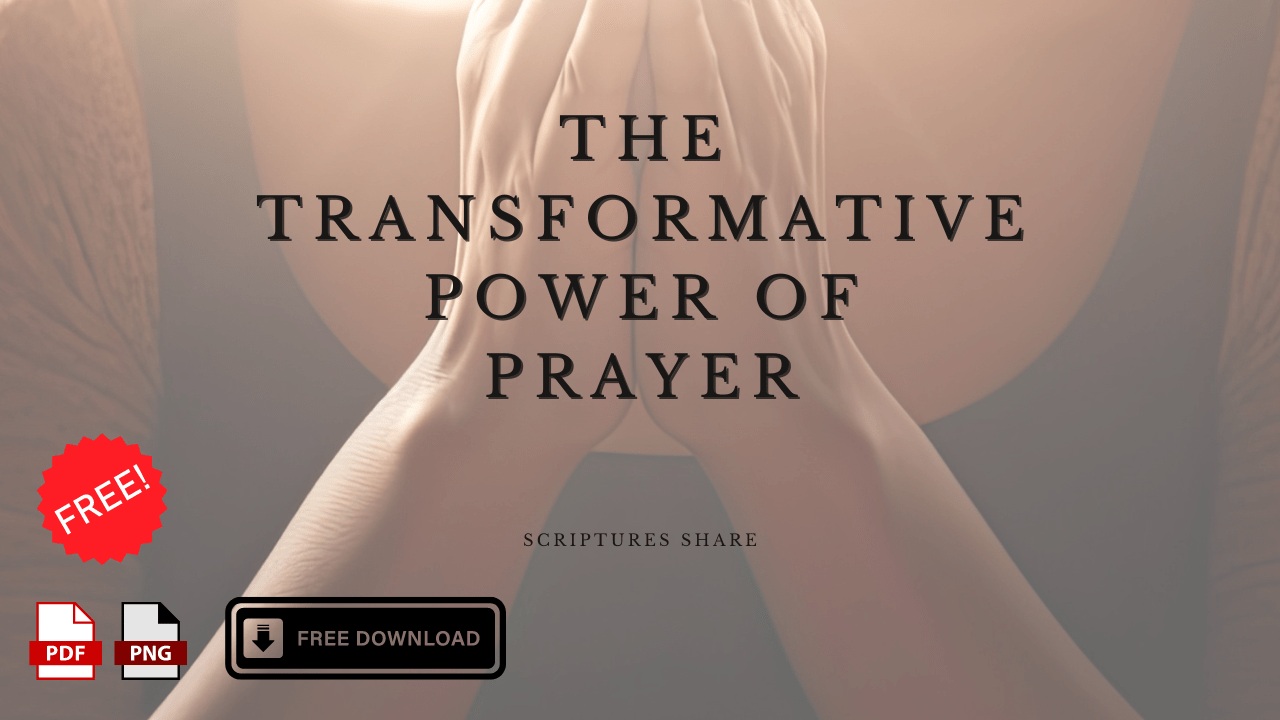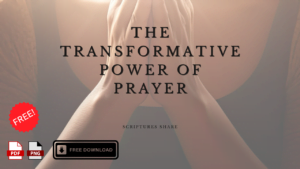This post contains affiliate links.
In this insightful ebook, “The Transformative Power of Prayer,” we explore the profound impact that prayer can have on our lives. From its ability to shape our thoughts and actions to its transformative influence on our relationships and the world, prayer is a powerful tool for personal and spiritual growth.
Through exploring the science, psychology, and spiritual aspects of prayer, this ebook offers practical tips and guidance for deepening your prayer practice and experiencing its transformative power in your life. Whether seeking guidance, healing, or a deeper connection with the divine, “The Transformative Power of Prayer” will inspire and empower you on your spiritual journey.
Prayer has the remarkable ability to transform our lives from the inside out. When we engage in prayer, we are not simply reciting words; we are opening ourselves up to the divine presence and inviting it to work in and through us. This transformative power of prayer can be seen in how it shapes our thoughts, feelings, and actions, guiding us toward a more compassionate, loving, and empathetic way of being.
Through prayer, we can cultivate virtues such as patience, humility, and forgiveness, essential for personal growth and spiritual development. Prayer teaches us to be mindful of our thoughts and intentions, helping us to align them with our deepest values and beliefs. As we continue to pray, we begin to see the world through a different lens, one that is filled with love, grace, and understanding.
Moreover, prayer has the power to transform our relationships with others. We can foster forgiveness, reconciliation, and healing by praying for those we love and those who may have wronged us. Prayer also enables us to cultivate empathy and compassion for those suffering, inspiring us to take action and make a positive difference in the world. In this way, prayer not only transforms our individual lives but also has the potential to transform the world around us, one prayer at a time.
Click Here
I. Introduction:
The Power of Prayer
Prayer is a universal language that speaks to the depths of the human soul. It transcends cultures, religions, and beliefs, offering solace, hope, and connection to something greater than ourselves. Whether whispered in the quiet of the night or proclaimed in a bustling congregation, prayer is a profound expression of our deepest desires, fears, and gratitude.
People pray in times of joy and sorrow in every corner of the world, seeking comfort, guidance, and understanding. It is a practice that has endured through centuries, a testament to its enduring power and relevance in our lives.
The Importance of Prayer in Spiritual Life
Prayer is more than just a ritual or a religious practice; it is a means of communication with the divine, a way to connect with the source of all creation. We express our faith, hopes, and love for the divine through prayer.
Prayer also plays a crucial role in our spiritual development. It helps us cultivate virtues such as patience, humility, and compassion. It teaches us to be mindful of our thoughts and intentions, guiding us towards a more meaningful and purposeful life.
A Personal Anecdote: Finding Peace in Prayer
I still remember the day when I felt lost and alone, unsure of where to turn or what to do. In that moment of despair, I turned to prayer, seeking solace and guidance. As I poured out my heart to the divine, I felt a sense of peace and calm wash over me, as if a weight had been lifted off my shoulders.
From that day on, prayer became a constant companion, a source of strength and comfort in times of need. It taught me to trust in something greater than myself, surrender my fears and doubts, and embrace life’s journey with faith and courage.
In this ebook, we will explore the power of prayer and its profound impact on our spiritual lives. We will explore the science behind prayer, its role in different religions, and practical tips for deepening your prayer practice. Join me on this journey of discovery as we unlock the transformative power of prayer together.
Section 2: Understanding Prayer
Definition and Purpose of Prayer
Prayer is a deeply personal and spiritual practice that involves communication with a higher power or divine being. It is a way to express our thoughts, feelings, and desires and seek guidance, solace, and connection. Prayer is not limited to words; it can also be expressed through silence, meditation, or contemplation.
The purpose of prayer varies from person to person and from culture to culture. For some, prayer is a way to give thanks and show gratitude for the blessings received. For others, it is a means of seeking forgiveness or asking for help in times of need. Regardless of the specific purpose, prayer is a powerful tool for connecting with the divine and deepening our spiritual lives.
Different Types of Prayer
There are many different types of prayer, each serving a unique purpose and function. Some common types of prayer include:
Adoration: This prayer involves praising and worshipping the divine for who they are and what they have done.
Confession: Confessional prayer involves acknowledging and repenting for sins or wrongdoings, seeking forgiveness and reconciliation.
Thanksgiving: Thanksgiving prayer expresses gratitude to the divine for blessings received, both big and small.
Supplication: Supplication prayer involves asking the divine for help, guidance, or intervention in specific situations or for specific needs.
Each type of prayer serves a different purpose, but collectively, they help to deepen our relationship with the divine and strengthen our spiritual connection.
Benefits of Prayer
Prayer offers many spiritual, emotional, and even physical benefits. Some of the key benefits of prayer include:
- Spiritual Growth: Prayer helps us deepen our relationship with the divine and grow in our faith and spirituality.
- Emotional Healing: Prayer can be a source of comfort and solace in times of grief, sadness, or despair, helping us to find peace and healing.
- Stress Reduction: Prayer has been shown to reduce stress levels and promote calm and relaxation.
- Improved Relationships: Prayer can help us cultivate virtues such as compassion, forgiveness, and humility, which can improve our relationships with others.
Overall, prayer is a powerful tool for deepening our spiritual connection and enhancing our well-being.
Section 3: The Science of Prayer
Understanding the Brain and Prayer
Neuroscience research has shown that prayer can profoundly impact the brain. When we engage in prayer, certain areas of the brain associated with attention, empathy, and self-awareness become active. This suggests that prayer is a spiritual practice and a mental exercise that can help improve our cognitive function and emotional well-being.
Effects of Prayer on Mental Health
Studies have also shown that prayer can have positive effects on mental health. Regular prayer has been linked to reduced symptoms of anxiety, depression, and stress. It can also improve well-being and promote a more positive outlook on life. These mental health benefits result from prayer’s ability to calm the mind, reduce negative thinking, and promote a connection with something greater than oneself.
Prayer and Physical Health
In addition to its mental health benefits, prayer has also been linked to improved physical health. Research has shown that people who pray regularly tend to have lower blood pressure, reduced risk of heart disease, and stronger immune systems. These physical health benefits are believed to be the result of prayer’s ability to reduce stress and promote a sense of well-being, which can positively impact overall health.
Prayer and Quantum Physics
Some researchers have proposed that prayer may connect to quantum physics, the branch of physics that deals with the behavior of particles on a subatomic level. According to this theory, prayer could be a form of energy that can influence the physical world in ways that are not yet fully understood. While more research is needed to understand the relationship between prayer and quantum physics fully, the idea suggests that prayer may have a deeper and more profound impact on reality than we currently realize.
In conclusion, the science of prayer is a fascinating field still being explored. While much remains to be understood, the research suggests that prayer has a powerful impact on the brain, mental health, and even physical health. As we continue to study the effects of prayer, we may uncover even more about its potential to transform our lives for the better.
Section 4: Prayer in Major Religions
Christianity
In Christianity, prayer is considered a fundamental aspect of faith and is practiced in various forms. Through prayer, Christians can communicate with God, seek guidance, and express gratitude. Common forms of prayer in Christianity include the Lord’s Prayer, a model prayer taught by Jesus, and intercessory prayer, where believers pray on behalf of others.
Islam
In Islam, prayer, or Salah, is one of the Five Pillars of Islam and is considered obligatory for all Muslims. Muslims are required to pray five times a day facing the Kaaba in Mecca. Prayer in Islam involves reciting verses from the Quran and performing a series of physical movements, such as bowing and prostrating, as a form of submission to Allah.
Judaism
In Judaism, prayer is a central aspect of worship and a way to connect with God. Jewish prayer often involves reciting prayers from the Siddur (Jewish prayer book) and can be done individually or in a group setting, such as in a synagogue. Some key players in Judaism include the Shema, which declares the oneness of God, and the Amidah, a series of blessings and petitions.
Buddhism
In Buddhism, prayer is a way to cultivate mindfulness, compassion, and wisdom. Buddhist prayers often involve reciting mantras, such as “Om Mani Padme Hum,” or offering prayers and blessings to the Buddha and other enlightened beings. Prayer in Buddhism is seen as a way to purify the mind and cultivate positive qualities.
Hinduism
In Hinduism, prayer is an integral part of daily life and is done in various forms, such as reciting prayers, chanting mantras, or performing rituals. Hindu prayers are often dedicated to specific deities, such as Vishnu, Shiva, or Devi, and are believed to invoke their blessings and protection. Prayer in Hinduism is seen as a way to express devotion and seek divine guidance.
Commonalities and Differences
While the forms and practices of prayer vary among these religions, they all share a common belief in the power of prayer to connect with the divine, seek guidance, and cultivate virtues such as compassion and gratitude. Despite these commonalities, there are differences in how prayer is practiced and understood, reflecting each religion’s diverse beliefs and traditions.
Section 5: Methods and Techniques of Prayer
1. Meditation
Meditation is a form of prayer that involves quieting the mind and focusing on a specific thought, word, or image. It is a way to cultivate mindfulness and deepen one’s spiritual connection. Meditation can be done in silence or guided by a teacher or recording.
2. Contemplative Prayer
Contemplative prayer is a form of prayer that involves silently contemplating the presence of God or a divine being. It is a way to deepen one’s awareness of the divine and cultivate peace and tranquility.
3. Intercessory Prayer
Intercessory prayer is a form of prayer where one prays on behalf of others. It is a way to express compassion and empathy for others and to seek blessings and guidance on their behalf.
4. Journaling
Journaling is a form of prayer where one writes down their thoughts, feelings, and prayers. It is a way to reflect on one’s spiritual journey and to express gratitude, hopes, and concerns to the divine.
5. Prayer Beads
Prayer beads, such as rosaries or mala beads, are used in many religious traditions to keep track of prayers and aid in concentration. They can recite prayers or mantras repetitively, helping to focus the mind and deepen one’s connection to the divine.
6. Prayer Walks
Prayer walks involve walking in nature or a sacred space while praying or meditating. It is a way to connect with the divine through creation’s beauty and find peace and solace in the natural world.
7. Breath Prayer
Breath prayer is a form of prayer that involves repeating a short prayer or phrase in sync with one’s breathing. It is a way to center oneself and focus on the divine’s presence in each breath.
Tips for Creating a Prayer Routine
- Set aside a specific time and place for prayer each day
- Start with short, simple prayers and gradually increase the length and complexity as you become more comfortable
- Use prayer books, apps, or online resources to find prayers that resonate with you
- Experiment with different prayer techniques to find what works best for you
- Stay consistent and patient with your prayer practice, knowing it is a spiritual growth and connection journey.
Section 6: Overcoming Obstacles in Prayer
1. Dealing with Distractions
- Acknowledge distractions without judgment and gently bring your focus back to prayer
- Use techniques such as deep breathing or repeating a mantra to refocus your mind
- Find a quiet and peaceful environment for prayer to minimize external distractions
2. Addressing Doubts and Skepticism
- Remember that it’s normal to have doubts and questions about prayer
- Seek guidance from spiritual leaders or mentors who can help address your doubts
- Reflect on past experiences where prayer has been meaningful or impactful in your life
3. Finding Motivation and Perseverance
- Set realistic and achievable goals for your prayer practice
- Keep a prayer journal to track your progress and reflect on your experiences
- Stay connected to a community of believers who can support and encourage you in your prayer life
4. Developing a Meaningful Prayer Practice
- Experiment with different prayer techniques and find what resonates with you
- Make prayer a priority in your daily routine, even if it’s just for a few minutes
- Be open to new experiences and ways of praying, allowing your practice to evolve over time
5. Seeking Help for Persistent Challenges
- If you’re struggling with persistent challenges in prayer, consider seeking guidance from a spiritual counselor or therapist.
- Remember that it’s okay to ask for help and that resources are available to support you in your spiritual journey.
Conclusion:
Embracing the Journey of Prayer
Overcoming obstacles in prayer is a natural part of the spiritual journey. Acknowledging and addressing these challenges can deepen our prayer life and strengthen our spiritual connection. Remember that prayer is a personal and unique experience, and what works for one person may not work for another. Stay open to new experiences and approaches to prayer, and trust that your prayer journey will lead you to a deeper understanding of yourself and your relationship with the divine.
Bible verses that speak to overcoming obstacles:
Isaiah 41:10 (NIV): “So do not fear, for I am with you; do not be dismayed, for I am your God. I will strengthen you and help you; I will uphold you with my righteous right hand.”
Philippians 4:13 (NIV): “I can do all this through him who gives me strength.”
Joshua 1:9 (NIV): “Have I not commanded you? Be strong and courageous. Do not be afraid; do not be discouraged, for the Lord your God will be with you wherever you go.”
Romans 8:31 (NIV): “What, then, shall we say in response to these things? If God is for us, who can be against us?”
Psalm 18:29 (NIV): “With your help I can advance against a troop; with my God I can scale a wall.”
2 Corinthians 12:9-10 (NIV): “But he said to me, ‘My grace is sufficient for you, for my power is made perfect in weakness.’ Therefore I will boast all the more gladly about my weaknesses, so that Christ’s power may rest on me. That is why, for Christ’s sake, I delight in weaknesses, in insults, in hardships, in persecutions, in difficulties. For when I am weak, then I am strong.”
Isaiah 40:31 (NIV): “But those who hope in the Lord will renew their strength. They will soar on wings like eagles; they will run and not grow weary, they will walk and not be faint.”
Psalm 34:17 (NIV): “The righteous cry out, and the Lord hears them; he delivers them from all their troubles.”
James 1:2-4 (NIV): “Consider it pure joy, my brothers and sisters, whenever you face trials of many kinds, because you know that the testing of your faith produces perseverance. Let perseverance finish its work so that you may be mature and complete, not lacking anything.”
Section 7: The Power of Group Prayer
Benefits of Group Prayer
- Group prayer can create a sense of unity and community among believers
- It can amplify the power of individual prayers as believers come together with a shared intention
- Group prayer can provide support and encouragement, especially in times of difficulty or crisis
How to Start or Join a Prayer Group
- Look for existing prayer groups in your community or place of worship
- Consider starting your prayer group with friends, family, or members of your community
- Decide on a regular meeting time and place, and establish guidelines for how the group will pray together
Stories of Answered Prayers from Group Settings
- Share stories or testimonies of when group prayer has led to tangible results or answered prayers.
- Highlight the connection and support that group prayer can provide in need.
- Encourage readers to seek out or form their prayer groups to experience the power of collective prayer.
The Impact of Group Prayer
Group prayer is a powerful way to deepen your spiritual connection and experience the support and encouragement of a community of believers. Whether you’re joining an existing prayer group or starting your own, coming together with others to pray can profoundly impact your spiritual life and your relationship with the divine.
Section 8: Prayer and Personal Growth
The Role of Prayer in Spiritual Development
- Prayer helps us cultivate virtues such as patience, humility, and compassion.
- It teaches us to be mindful of our thoughts and intentions, guiding us toward a more meaningful and purposeful life.
- Through prayer, we can deepen our understanding of ourselves and our place in the world.
Developing Virtues Through Prayer
- Patience: Praying for patience can help us learn to accept things as they are and trust in divine timing
- Humility: Praying for humility can help us recognize our limitations and seek guidance from a higher power
- Compassion: Praying for compassion can help us cultivate empathy and understanding towards others
Using Prayer for Self-Reflection and Personal Development
- Prayer can be a tool for self-reflection, allowing us to examine our thoughts, feelings, and actions.
- It can help us identify areas for growth and development and guide us toward positive change.
- Prayer can also be a source of inspiration and motivation, encouraging us to strive for our highest ideals.
Embracing Personal Growth Through Prayer
Prayer is a powerful tool for personal growth and development. By cultivating virtues such as patience, humility, and compassion through prayer, we can deepen our spiritual connection and become more aligned with our true selves. Through prayer, we can embark on self-discovery and personal transformation, leading us to a more fulfilling and purposeful life.
Section 9: Prayer for Healing and Guidance
Prayer is often a refuge in physical, emotional, or spiritual distress. Many people turn to prayer seeking healing and guidance, believing it can bring comfort and relief.
Physical Healing:
Prayer for physical healing is a common practice in many religious traditions. It is believed that prayer can invoke divine intervention to restore health and well-being. While the efficacy of prayer for physical healing is a topic of debate, many individuals find solace and strength in prayer during times of illness or injury.
Emotional Healing:
Prayer can also be a source of emotional healing. It provides a space to express feelings of sadness, anger, or fear and can bring a sense of peace and comfort. Through prayer, individuals can find the strength to cope with difficult emotions and experiences.
Spiritual Healing:
Prayer is a means to seek spiritual healing to address guilt, shame, or spiritual emptiness. It offers a way to connect with a higher power and find forgiveness, redemption, and renewal of spirit.
Guidance:
Prayer is often used to seek guidance and direction in life. Many believe that through prayer, they can receive insights, clarity, and wisdom to make important decisions or navigate challenging situations. Prayer can help individuals feel connected to a higher purpose and trust in divine guidance.
Stories of Healing and Guidance:
Countless stories of individuals who have experienced healing and guidance through prayer. These stories often serve as a source of inspiration and hope for others facing similar challenges. Whether it’s a miraculous recovery from illness or a newfound sense of direction in life, these stories illustrate the profound impact that prayer can have.
Conclusion:
Prayer for healing and guidance is a deeply personal and powerful practice. While the outcomes of prayer may vary, many people find comfort, strength, and clarity through prayer. Whether seeking physical healing, emotional comfort, or spiritual renewal, prayer can be a source of solace and support in times of need.
Section 10: Maintaining a Healthy Prayer Life
Maintaining a healthy prayer life is essential for nurturing your spiritual well-being and deepening your connection with the divine. Here are some strategies to help you cultivate a sustainable and fulfilling prayer routine:
1. Consistency is Key:
Consistency is essential in prayer. Set aside dedicated time each day for prayer, whether in the morning, evening or during breaks throughout the day. Establishing a routine will help prayer become a natural and integrated part of your daily life.
2. Quality Over Quantity:
Focus on the quality of your prayers rather than the quantity. It’s not about how long you pray but the sincerity and intention behind your prayers. Whether your prayers are brief or lengthy, count each moment by cultivating a deep sense of presence and connection with the divine.
3. Variety in Prayer:
Explore different forms of prayer to keep your practice fresh and engaging. Experiment with silent meditation, reciting prayers or mantras, journaling, or engaging in prayer walks. Variety in your prayer practice can help prevent boredom and deepen your spiritual experience.
4. Listen as You Speak:
Prayer is not just about speaking; it’s also about listening. Cultivate an attitude of openness and receptivity during prayer, allowing yourself to listen for the voice of the divine. Be attentive to any insights, inspirations, or guidance that may arise during your prayer time.
5. Stay Present and Engaged:
Avoid falling into a routine where prayer becomes mechanical or rote. Stay present and engaged in the moment, bringing your full attention and awareness to your prayers. Approach each prayer as an opportunity to deepen your relationship with the divine and nurture your spiritual growth.
6. Seek Support and Accountability:
Surround yourself with a supportive community of fellow believers who can encourage and uplift you in your prayer life. Consider joining a prayer group or finding an accountability partner with whom you can share your prayer experiences and challenges.
7. Embrace Flexibility:
Be flexible and adaptable in your prayer routine. Life is full of unexpected twists and turns, and your prayer practice may need to evolve to accommodate changing circumstances. Allow yourself to adjust your prayer routine as needed while staying committed to your spiritual growth.
“Prayer is the key that unlocks the door to God’s infinite grace and wisdom. Through prayer, we find strength, guidance, and peace during life’s challenges. Let your prayers be a beacon of light that illuminates your path and fills your heart with hope. Trust in the power of prayer, for it can transform your life and bring you closer to the divine.”
Conclusion:
Maintaining a healthy prayer life requires dedication, intentionality, and openness. By cultivating consistency, quality, variety, receptivity, presence, support, and flexibility in your prayer routine, you can deepen your spiritual connection and experience the transformative power of prayer in your life.
Section 11: Conclusion
In conclusion, prayer is a powerful and transformative practice that has the potential to deepen our spiritual connection and enrich our lives in profound ways. Whether seeking guidance, solace, healing, or simply a sense of peace, prayer offers us a pathway to connect with the divine and access a source of infinite love and wisdom.
Throughout this guide, we have explored the various aspects of prayer, from its definition and purpose to its impact on our physical, emotional, and spiritual well-being. We have also examined the different forms of prayer practiced in major religions and explored practical tips for deepening our prayer practice.
As you continue on your journey of prayer, remember that it is a personal and unique experience. There is no right or wrong way to pray; what matters most is the sincerity and intention behind your prayers. Whether you pray silently in solitude or gather with others in communal prayer, may your prayers be a source of comfort, strength, and guidance.
May this guide serve as a source of inspiration and encouragement as you explore the power of prayer and deepen your spiritual connection. May your prayers be a beacon of light in times of darkness, a source of hope in times of despair, and a pathway to peace during life’s challenges.
May you experience the transformative power of prayer in your life, and may it lead you to a deeper understanding of yourself, your purpose, and your relationship with the divine.
If you’re seeking a deeper connection with the divine, prayer is the bridge that can lead you there. Take a moment each day to quiet your mind, open your heart, and speak to the higher power within and around you. Through prayer, you’ll find solace, guidance, and a sense of peace that transcends understanding.”
Getting in touch with the divine can be as simple as finding a quiet space, closing your eyes, and speaking from your heart. Whether you pray silently or aloud, know that your words are heard and your intentions are felt. The divine is always present, waiting to listen and offer guidance.
This post contains affiliate links.














